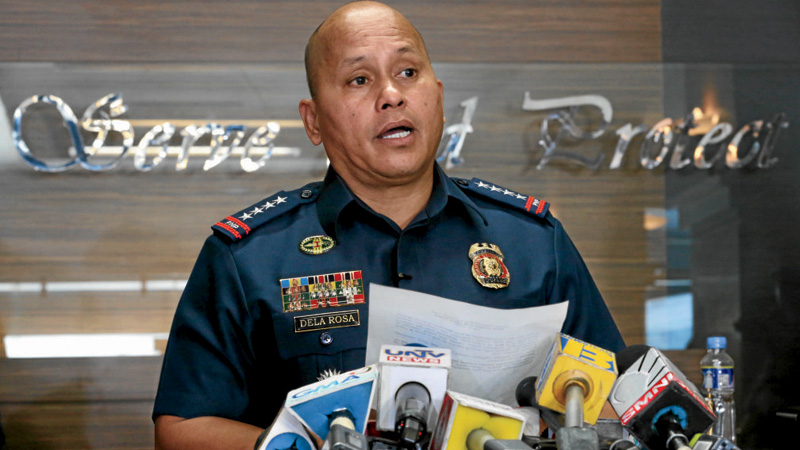
Philippine National Police Director General Ronald “Bato’ dela Rosa
INQUIRER FILE PHOTO / NINO JESUS ORBETA
MANILA — The Philippine National Police is planning a shift in its anti-illegal drugs campaign, but nothing seems to be final yet.
Proposals for the shift in the government’s Oplan Double Barrel were discussed at the PNP command conference, Tuesday, in Camp Crame presided by PNP Director General Ronald Dela Rosa and attended by chiefs of PNP major branches and regional offices.
“That will be discussed today and we will report whatever will be the directive of the PNP chief and the tasks that will given to our regional offices,” the PNP public information chief, Senior Supt. Dionardo Carlos told reporters.
Carlos said one of the “possible” shifts would be for the PNP to concentrate on “high value targets.”
“That’s possible because there will be targets by provincial, regional and national teams. It may be towards that end,” he said, but declined to elaborate.
The command conference was still ongoing on Tuesday afternoon.
Dela Rosa, in a press briefing before the conference, mentioned the anti-drug campaign in answer to a wire report quoting unnamed police officials complaining that they felt they were being pressured to meet targets on the number of drug pushers and drug users surrendering.
Dela Rosa scored the anonymous comments and said the unnamed police officials should be courageous enough to air their grievance to him directly.
“If you have balls, talk to me. If you’re dissatisfied by what’s happening, be open to the Chief. If you don’t want to talk to me, talk to your regional director, don’t go to the media to tell those things,” he said.
He told the police officials that undermining the President’s campaign against drugs and crime could be administratively punished.
“That’s not just conduct unbecoming of a police officer, that’s insubordination–because what you’re doing is undermining the effort of the President. Admonish your men,” he said.
Dela Rosa earlier submitted to the President a list provided by the National Capital Region Police Office of about 30 celebrities said to be involved in illegal drugs. The PNP chief said Mr. Duterte got his own list of “celebrity watchlist.”
In his speech before he left for Japan, Duterte said he would delay his disclosure of the second batch of policemen, judges, local officials, celebrities and other prominent people involved in drugs as he would be consulting with Congress about the proper course of action to take.
Dela Rosa also said the PNP “will announce our moves” after Duterte’s unveiling of the second list.
According to a police official, who spoke on the condition of anonymity, any shift or new phase in the anti-drug drive would need extra funding.
“We have many options for the shift, but these may be finalized when the 2017 budget is approved. For example, tracking down high-value targets who have gone into hiding will require additional funding for operations and intelligence work. Additional personnel may also be needed,” he said.
Other topics discussed by Dela Rosa included the results of his meeting with his Chinese counterparts when he accompanied Mr. Duterte in the latter’s visit to China, the security plans for the Association of Southeast Asian Nations summit in Manila in 2017, and the ongoing investigation of the clash between protesters and policemen in front of the United States Embassy in Manila last week.
Dela Rosa said he brought from China armored vests and “monitoring equipment,” which he declined to describe, that would be used in anti-drug operations. He also praised the sincerity of Chinese police officials during their meeting.
On the US Embassy melee, Dela Rosa said he would rather wait for the PNP-Criminal Investigation and Detection Group to finish its probe before commenting on proposals for the creation of an independent team to do the task.
Dela Rosa also deplored media reports about Abu Sayyaf bandits having reportedly gone to Cebu last week. The PNP chief said the information was “not yet fully validated” and the police officer who was the source of the report would be scolded for talking to the media.
Dela Rosa said suspected members of the bandit group might be have been roaming the country, including Metro Manila, but the police have been constantly monitoring them to see if they would implement terror plots.
“Actually those Abu Sayyaf, when they leave [their base of operations] they don’t have arms and they go to the trips on their own. Actually, they can reach as far as Metro Manila, let’s be frank about it,” he said.
The PNP-Anti-Kidnapping Group and the Central Visayas regional police office said they got an intelligence report that the suspected Abu Sayyaf members have returned to the Zamboanga region. SFM